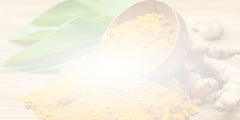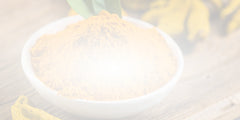
We all feel anxious sometimes, though some people are forced to deal with those feelings chronically. Anxiety has become one of the leading mental health issues in the country and is not slowing down despite our best efforts.
Despite the severity of anxiety, it also suffers from stigma as many people refuse to take the condition seriously and view it as an excuse. This stigma has made living with anxiety an extremely difficult prospect for modern Americans and has reinforced the need for tools to combat the symptoms. While there are multiple pharmaceutical options for treating anxiety, some people are not eager to use them for fear of developing an addiction. This has led many to look into more holistic alternatives for treating their anxiety symptoms.
While it might seem odd that anything short of pharmaceutical-grade medications could treat anxiety, several plants are capable of the task. One of the more surprising examples of such plants is Curcuma longa, known colloquially as turmeric. Turmeric has become one of the more popular tools used by herbalism enthusiasts due to its wide range of health benefits.
While turmeric is known for its ability to help with physical ailments, it also possesses traits that make it viable as a mental health supplement. The question that is likely on your mind is how something as simple as turmeric can help treat a condition as complicated and debilitating as anxiety.
What is Anxiety?
The term "anxiety" is often viewed through a narrow lens, which means that most people have a cursory understanding of the concept but do not realize how extensive the condition is. It also causes most people to underestimate anxiety and disregard it as an excuse. It is common for people to experience anxiety in response to personal and professional stressors. Often, this is the definition most people apply when someone tells them they are dealing with anxiety. Unfortunately, the reality of anxiety is far more severe and goes beyond stressful life events.
The biggest misconception about anxiety is that it exists as a stress-induced response or a single mental health disorder. The truth is that anxiety is a category of potential disorders. According to The Diagnostic and Statistical Manual of Mental Disorders, Fifth Edition (DSM-5), multiple variants of anxiety disorders can afflict us. Some forms of anxiety focus on specific stimuli, such as agoraphobia, which is a crippling fear of the outside world. Others are broader and can apply to multiple situations, but without psychiatric evaluation, it is impossible to determine what anxiety disorder might affect you.

About 30% of people are affected by an anxiety disorder at some point in their adult lives. However, the most common anxiety disorder is Generalized Anxiety Disorder (GAD) which, as the name implies, is one of the broader examples. GAD is a form of anxiety that has people worrying about day-to-day tasks and activities excessively. In extreme cases, GAD can be crippling and prevent people from living productive lives unless they seek help. Unfortunately, mental health care is treated with a similar stigma to the anxiety that requires treatment.
Regardless, seeking professional assistance for anxiety is important to your recovery and should never be avoided. With that in mind, you can enhance treatments by using certain supplements proven to help with certain anxiety disorders. This supplementation process might not be effective for every type of anxiety but might give those suffering from GAD a little boost.
Can Turmeric Help Anxiety?
Given the popularity of turmeric amongst health enthusiasts and herbalists, it is no surprise that many have begun to wonder about its effects on mental health issues. The answer to that curiosity is a little more complicated than you might initially believe. Technically, the turmeric root does not help with anxiety or any major health issue your might experience.
The benefits associated with turmeric can be traced to a single compound native to the Curcuma longa plant. The most important compound in turmeric is called curcumin, which is directly responsible for almost every major health benefit that turmeric offers. The issue is that turmeric roots contain very little curcumin, but we will elaborate on that later.
While the root might not be helpful for anxiety, there is evidence to suggest that curcumin is very useful for such issues. While curcumin is not a substitute for legitimate psychological care in cases of serious anxiety disorders, it can help bolster your treatment. Specifically, curcumin might be able to provide your brain with hormones that promote feelings of calm and happiness. Research has linked curcumin use to increased concentrations of dopamine and serotonin in the brain.
- Dopamine: Dopamine is a chemical our bodies naturally produce and our brains release to produce a "feel good" sensation. Dopamine release is traditionally caused by activities we enjoy and exposure to sunlight and exercise.
- Serotonin: Serotonin is another chemical our bodies produce, but this one helps us regulate our mood and fall asleep. Basically, serotonin helps us feel relaxed.
Curcumin has been found to increase levels of both substances in our bodies, which can help protect against some of the more common symptoms of anxiety. When the levels of these chemicals are low, it is easier for depression and anxiety to take hold. Unfortunately, serotonin and dopamine levels are not the only important factors in fighting anxiety.

Sometimes, what we introduce to our bodies or exposure to certain substances can induce anxiety symptoms. Currently, a sulfur-based food preservative called sulfite is used in several common foods such as bread, pizza dough, jellies, and more. Unfortunately, sulfite has been linked to increased levels of anxiety.
Despite the issues with sulfite, there is more evidence to suggest that curcumin can help counter the effects of foodborne anxiety. While the study on curcumin's effects against sulfite-induced anxiety was conducted on rats, the results were extremely promising. The curcumin given to the subjects helped reduce the concentration of sulfates in their bodies and reduced the associated anxiety.
Ultimately, the best way to avoid this preservative is to alter your diet to avoid foods that use sulfite. Unfortunately, this might not always be possible, given how widespread the preservative has become. Nevertheless, it might be possible to counteract the effects enough to support your primary treatment so your anxiety no longer dictates your life.
While curcumin cannot be used as a substitute for psychiatric treatment, it might be able to replace certain medications prescribed for anxiety. Namely, research suggests that curcumin might be more effective than Prozac for treating anxiety. It is important to remember that this particular study needs further research before it can be taken as fact. Nevertheless, the initial results are so promising that further studies will likely be forthcoming in the near future.
Using turmeric curcumin in treating anxiety could provide you with a powerful tool against one of the most common mental health issues. Unfortunately, curcumin is far from perfect and has a severe handicap.
The Problem With Curcumin
We briefly touched on how curcumin is not readily available in turmeric roots. Unfortunately, a turmeric root contains a very small concentration of turmeric, with a single root only containing between 2 to 5% curcumin. This low percentage means a 3 g serving of turmeric root will only yield around 0.0942 g of curcumin. This means the curcumin in turmeric is negligible for anyone looking to capitalize on the curcuminoid's benefits.
This lack of curcumin has led to the cultivation of curcumin to produce supplements rather than force people to rely on turmeric consumption. This turn of events has made it so that we do not have to eat multiple turmeric roots to get our daily dose.
Unfortunately, even the harvesting of curcumin does not solve the substance's biggest problem. The main issue with curcumin is that it bears a ridiculously low bioavailability level, meaning our bodies have difficulty absorbing any. Curcumin does not stay in the body long enough for it to disseminate the substance through our body so we can reap the benefits.

Curcumin's low bioavailability is thought to be because it is a fat-soluble substance rather than a water-soluble substance. This means that the curcumin that makes it to our digestive tract does not dissolve and is excreted without making a difference.
Fortunately, correcting the bioavailability issue with curcumin is extremely easy and can be accomplished with something you likely already possess. A substance known as piperine can radically increase certain substances' bioavailability. When combined with turmeric curcumin, it has been known to boost the bioavailability of the latter by 2,000%. This means taking curcumin with piperine essentially guarantees you will absorb enough curcumin to feel the effects. The question you might be asking is, "what is piperine?" Piperine is one of the main compounds found in black pepper.
Accessing piperine is as easy as tracking down your pepper shaker and adding some to your curcumin extract. However, if you use a curcumin supplement, it likely already has piperine. Most vendors make their supplements with piperine, so the bioavailability issues are solved without any effort on your part. Improving the bioavailability of curcumin is extremely easy, which might lead you to believe this is the only major issue that might affect you. Unfortunately, there is one last detail you must consider if you intend to use curcumin to treat your anxiety.
The Risk of Curcumin
As with most supplements and medication, curcumin is not without its issues and risks. While curcumin has been identified as a substance that is safe for human consumption, this does not mean it is safe for everyone. The biggest concern with curcumin is something you likely heard about if you are currently taking prescription medications.
Any doctor, psychiatrist, or medical professional will tell you that certain medications cannot be taken simultaneously due to possible interactions. Interactions between medications can cause serious health issues or even death in extreme cases. Unfortunately, the biggest risk with curcumin is that it might interact with current prescriptions.
Curcumin is a blood thinner. When curcumin is consumed, the blood in our veins will flow better, but this means using curcumin alongside blood-thinning medication is potentially dangerous.

Curcumin should be avoided if you are currently using any of the following medications:
- Heparin
- Warfarin (Brands include Jantoven and Coumadin)
- Aspirin
- Clopidogrel (Brands include Plavix)
- Diclofenac (Brands include Flector, Cambia, and Voltaren)
- Ibuprofen (Brands include Advil and Motrin)
- Naproxen (Brands include Aleve, Anaprox, and Naprosyn)
- Dalteparin (Brands include Fragmin)
- Enoxaparin (Brands include Lovenox)
Combining an anticoagulant with other blood-thinning medication increases your chances of experiencing a spontaneous bleed. It also means those bleeds will not coagulate, and you could lose more blood than you should. While you are not likely to bleed out, you might pass out and hurt yourself further.
The Nu, Healthier You
Turmeric might have humble origins, but the curcumin found within has proven to be one of the more impressive supplements in modern healthcare. Unfortunately, we cannot eliminate the prevalence of anxiety with supplements alone. We want to reiterate that seeking professional care for anxiety is the best way to overcome the condition. Curcumin supplements can help reinforce the effects of your treatment, but the only way to truly recover is to address the root cause. If you want to use curcumin supplements to help strengthen your recovery, the only remaining issue is finding a reliable vendor.

We at NuVitality are more than happy to help with that last part. We believe that natural supplements are the best tool when tackling any issue and mental health is no exception. Our popular turmeric curcumin supplements are manufactured with piperine as a primary ingredient to overcome curcumin's main handicap. Dealing with anxiety is not easy, and we want to contribute to your recovery the only way we can and help you take the anxiety out of finding a supplement. We encourage you to visit our website and take the first step to the Nu, healthier you.
If you're looking for any additional knowledge about turmeric, we highly urge you to check out our other articles on the topic! We've written a plethora of articles on turmeric, curcumin, its uses, and so much more, so you're bound to find something beneficial.






